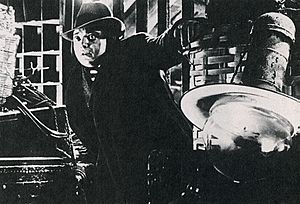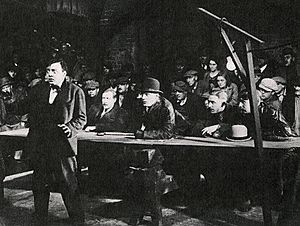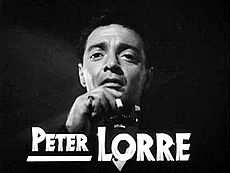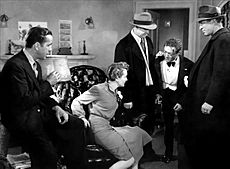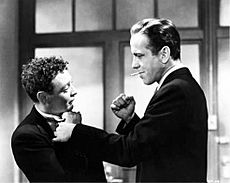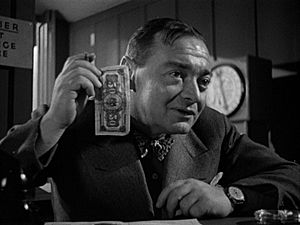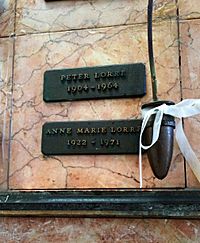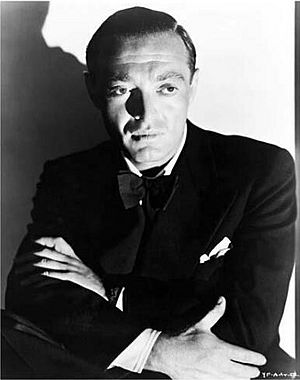Peter Lorre facts for kids
Quick facts for kids
Peter Lorre
|
|
|---|---|
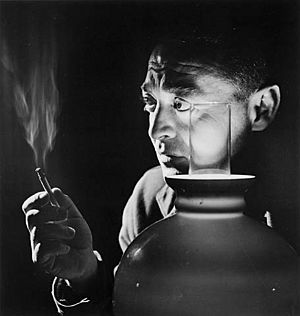
Portrait by Yousuf Karsh, 1946
|
|
| Born |
László Löwenstein
June 26, 1904 Rózsahegy, Austria-Hungary (now Ružomberok, Slovakia)
|
| Died | March 23, 1964 (aged 59) Los Angeles, California, U.S.
|
| Resting place | Hollywood Forever Cemetery |
| Occupation | Actor |
| Years active | 1929–1964 |
| Spouse(s) |
|
| Children | 1 |
Peter Lorre (born László Löwenstein on June 26, 1904 – March 23, 1964) was a famous actor from Hungary and America. He started his acting journey in Europe, first on stage in Vienna, and then in films in Berlin. He became very well known for his role in the 1931 German film M, directed by Fritz Lang.
Because of the rise of Adolf Hitler and the Nazi Party, Lorre, who was of Jewish background, left Germany. He then acted in films in the United Kingdom, including Alfred Hitchcock's The Man Who Knew Too Much (1934). Later, he moved to Hollywood in the United States. There, he became a popular actor in many crime and mystery movies. He often played characters who were a bit strange or mysterious.
From 1941 to 1946, Peter Lorre worked a lot for Warner Bros.. He appeared in many movies with famous actors like Humphrey Bogart and Sydney Greenstreet. Some of his most famous films from this time include The Maltese Falcon (1941) and Casablanca (1942). He also appeared in Frank Capra's Arsenic and Old Lace (1944) and Disney's 20,000 Leagues Under the Sea (1954). Peter Lorre was the first actor to play a James Bond villain, named Le Chiffre, in a TV version of Casino Royale (1954).
In 2017, a newspaper called The Daily Telegraph said he was one of the best actors who never got nominated for an Academy Award.
Contents
Peter Lorre: A Famous Actor
Early Life and Moving to Europe
Peter Lorre was born László Löwenstein on June 26, 1904. He was the first child of Alajos Löwenstein and Elvira Freischberger. They lived in a Hungarian town called Rózsahegy, which is now Ružomberok in Slovakia. His parents were German-speaking Jews who had recently moved there for his father's job. His father was often away because he was also a lieutenant in the Austrian Army Reserve.
When László was four, his mother passed away. His father then married his mother's best friend, Melanie Klein, and they had two more children. However, Peter Lorre and his stepmother did not get along well. In 1913, his family moved to Vienna, hoping to avoid a bigger war. His father served in the army during World War I but later managed a prison camp due to heart problems.
Becoming a Star in Europe
Peter Lorre started acting on stage in Vienna when he was 17. He worked with a puppeteer named Richard Teschner. He then moved to other cities like Wrocław and Zürich. In the late 1920s, he moved to Berlin, Germany. There, he worked with famous writer and director Bertolt Brecht in plays like Man Equals Man.
He became much more famous after director Fritz Lang chose him to play Hans Beckert in the film M (1931). Lang felt Lorre was perfect for the role and said it was one of the best performances in film history.
When the Nazis came to power in Germany in 1933, Lorre left the country. He went to Paris and then London. In London, he was noticed by Ivor Montagu, who helped him get a role in Alfred Hitchcock's film The Man Who Knew Too Much (1934). Even though his English was not perfect, he learned his lines by listening carefully. After this, he made another film with Hitchcock called Secret Agent (1936).
Moving to Hollywood
In 1934, Peter Lorre moved to Hollywood in the United States. He signed a contract with Columbia Pictures. At first, it was hard to find the right roles for him. He suggested making a movie based on the book Crime and Punishment by Dostoevsky, with himself in the main role.
For the film Mad Love (1935), Lorre played a crazy surgeon named Dr. Gogol. He even shaved his head for the part! Critics loved his performance, saying he was amazing at playing a scary and wicked character.
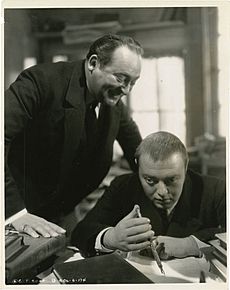
After Mad Love, he played the main character in Crime and Punishment (1935). Later, he signed a contract with 20th Century Fox. He starred in a series of movies as Mr. Moto, a Japanese detective and spy. While he liked the films at first, he soon found the role too simple. He even got hurt during a stunt in one of the Mr. Moto movies.
Working with Big Stars
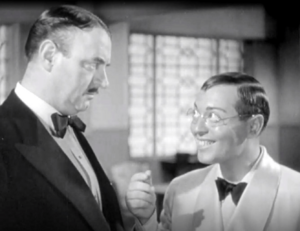
In 1941, Peter Lorre became a citizen of the United States. Director John Huston helped him get a role in The Maltese Falcon. This movie helped his career a lot. Lorre enjoyed working with actors like Humphrey Bogart, Sydney Greenstreet, and Claude Rains. He felt they could make the audience laugh and then become serious very quickly. He signed a contract with Warner Bros. that lasted until 1946.
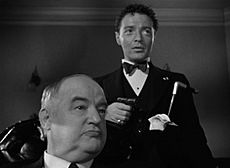
The year after The Maltese Falcon, he played Ugarte in Casablanca (1942). Even though it was a small part, his character was very important to the story. Lorre and Sydney Greenstreet made nine movies together. They were often called "Little Pete-Big Syd."
Lorre also showed his funny side in Frank Capra's Arsenic and Old Lace (released in 1944), starring Cary Grant. His last film for Warner Bros. was The Beast with Five Fingers (1946), a horror film.
Later Career and Famous Roles
After World War II, Peter Lorre's career in Hollywood slowed down. He focused more on radio and stage acting. In 1950, he went to West Germany to make a film called Der Verlorene (The Lost One). He helped write, directed, and starred in this movie.
In 1952, Lorre returned to the United States. He continued to act in TV shows and movies, often making fun of his own "creepy" image. He was the first actor to play a James Bond villain, Le Chiffre, in a TV show called Casino Royale (1954). He also starred with Kirk Douglas and James Mason in 20,000 Leagues under the Sea (1954).
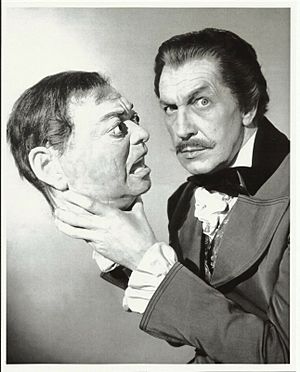
In his last years, he worked with director Roger Corman on several horror films. These included Tales of Terror (1962) and The Raven (1963), where he acted alongside other horror stars like Vincent Price and Boris Karloff.
Personal Life
Peter Lorre was married three times. His wives were Celia Lovsky (from 1934 to 1945), Kaaren Verne (from 1945 to 1950), and Anne Marie Brenning (from 1953 until his death). In 1953, he had his only child, a daughter named Catharine.
Health and Passing
Peter Lorre had some health problems, including issues with his gallbladder. He passed away in Los Angeles on March 23, 1964, from a stroke. His ashes are buried at the Hollywood Forever Cemetery in Hollywood. Actor Vincent Price spoke at his funeral.
His Legacy
Peter Lorre was honored with a star on the Hollywood Walk of Fame in February 1960. He was also a favorite character for cartoonists at Warner Bros. He appeared as a cartoon version of himself in Looney Tunes and as a fish in Horton Hatches the Egg. His unique acting style and voice left a lasting mark on cinema.
Filmography
Peter Lorre appeared in many films and television shows throughout his career. Here are some of his most notable roles:
Film
- 1931: M as Hans Beckert
- 1934: The Man Who Knew Too Much as Abbott
- 1935: Mad Love as Dr. Gogol
- 1935: Crime and Punishment as Roderick Raskolnikov
- 1937-1939: Mr. Moto series (various films) as Mr. Kentaro Moto
- 1940: Stranger on the Third Floor as The Stranger
- 1941: The Maltese Falcon as Joel Cairo
- 1942: Casablanca as Signor Ugarte
- 1944: Arsenic and Old Lace as Dr. Einstein
- 1951: The Lost One as Dr. Karl Rohte (also directed)
- 1954: 20,000 Leagues Under the Sea as Conseil
- 1962: Tales of Terror as Montresor
- 1963: The Raven as Dr. Adolphus Bedlo
Television
- 1954: Climax! as Le Chiffre in "Casino Royale"
- 1957, 1960: Alfred Hitchcock Presents (two episodes)
- 1962: Route 66 as Peter Lorre in "Lizard's Leg and Owlet's Wing"
|
See also
 In Spanish: Peter Lorre para niños
In Spanish: Peter Lorre para niños
 | William Lucy |
 | Charles Hayes |
 | Cleveland Robinson |


